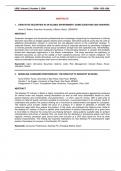IJBR, Volume 5, Number 2, 2006 ISSN: 1555-1296
ABSTRACTS
1. DERIVATIVE SECURITIES IN AN ISLAMIC ENVIRONMENT: SOME QUESTIONS AND ANSWERS
Karim S. Rebeiz, American University of Beirut, Beirut, LEBANON
ABSTRACT
Corporate managers and investment professionals are increasingly recognizing the importance of utilizing
derivative securities as hedges against adverse price changes. Derivative products could also be used as
additional diversification choices to maximize the risk-adjusted returns of the investment strategy. In
corporate finance, their utilizations allow for better timing of corporate decisions by permitting managers
to reverse planned investments should actual conditions diverge from the expected ones. Nevertheless,
derivatives have not been given adequate importance in the prevailing literature, a situation that probably
limited their meaningful applications in the Islamic marketplace. This study examines the legitimacy of
derivative securities, as well as the validity of their valuations process, from an Islamic viewpoint. The
paper only addresses simple derivatives, such as simple call options and futures, but the reasoning could
easily be extended to encompass other forms of derivative instruments.
Keywords: Islam; Derivative Securities; Options; Calls; Risk Management; Interest Rates; Koran;
Valuation; Sharia
2. MODELING CONSUMER PREFERENCES: THE DESKTOP PC INDUSTRY IN BRAZIL
Nuno M.M.D. Fouto, University of Sao Paulo, Sao Paulo, BRAZIL
Claudio F. de Angelo, University of Sao Paulo, Sao Paulo, BRAZIL
Rangamohan V. Eunni, Youngstown State University, Youngstown, Ohio, USA
ABSTRACT
The desktop PC industry in Brazil is highly competitive with several global players aggressively jockeying
for market share and margins among themselves as well as with local assemblers based on price,
product features and functionalities, and performance – in short, value for money. With a wide array of
choices to trade-off quality and price available to consumers, a successful player in the industry needs to
understand and position the product offering so to maximize its attractiveness and appeal to a prospect.
The hedonic price function relates the price of a product to a basket of attributes or benefits that
consumers seek when they acquire the product. In this study, we employed the hedonic price model to
the desktop PC industry in Brazil to identify what combination of product characteristics for a given price
is most likely to influence the consumer’s purchasing behavior. Using publicly available data on product
characteristics and prices of desktop PCs, we found that the attributes of processing speed, hard drive
capacity, memory, processor type, brand name and inclusion of a DVD drive stand out vis-à-vis other
product characteristics. This finding has important implications for how desktop PC manufacturers might
position themselves for success in the Brazilian PC market.
Keywords: Consumer Preferences, Desktop PC, Emerging Market, Brazil
, IJBR, Volume 5, Number 2, 2006 ISSN: 1555-1296
3. INTEREST RATE DERIVATIVES RISKS AND DISCLOSURES OF NOTIONAL AMOUNTS
Prakash K. Pai, The University of Texas of the Permian Basin, Odessa, Texas, USA
ABSTRACT
The purpose of this research was to investigate the extent of information about risk contained in derivatives'
notional amounts. A relation between the sensitivity of equity returns to interest rate fluctuations and the
notional amounts of interest rate derivatives positions was developed. The relationship between fluctuations
in risk ascertained through notional amounts and securities returns was used to ascertain whether the
notional amounts of derivative contracts contained significant relevant information about derivatives risk. The
implications of this research were that notional amounts provide incomplete information about derivative risk,
and that the disclosures of information about the notional amounts of non-derivative related interest rate
exposures are also important for risk analysis.
Keywords: Derivatives, notional amounts, disclosures, banks
4. A TEST FOR SPECULATIVE BUBBLES IN PROPERTY MARKETS
XIAO Qin, Nanyang Technological University of Singapore, SINGAPORE
ABSTRACT:
The real-estate market has the longest and the most reliable history of boom and bust cycles.
Researchers point to speculation as a prime force behind these cycles. Testing for speculative rational
bubbles is, however, thorny, because the contribution to an asset price by a hypothetical rational bubble
would not be directly distinguishable from that by an unobservable market fundamental. In this paper, I
employ a unit root Markov-switching approach to test for speculative bubbles in the property prices of
Hong Kong and Seoul. This procedure need not preclude the existence of unobservable fundamental
variables. The study reveals that a periodically-collapsing rational speculative bubble is responsible for
the observed large price swings in these markets.
Keywords: Markov-switching; unit root test; periodically-collapsing bubble; real-estate price
5. FISCAL DECENTRALIZATION IN THE TRANSITION TO MARKETS: LOCAL DEFICIT FINANCE
IN THE CZECH REPUBLIC
Phillip J. Bryson, Marriott School, Brigham Young University, Provo, Utah, USA
ABSTRACT
Only after the transition to market economics began in 1989 did Czech municipalities begin to regain
independence and the opportunity to leverage development expenditures. Funds for municipalities have
been scarce, yet they have not resorted to extensive deficit spending, except for a few of the larger cities.
Debt is monitored closely because local debt is considered a part of national debt by the European
Union, of which the Czech Republic has been a member since 2004. Debt is now regulated by the Czech
Republic and although it can be expected to increase somewhat with further development; it is not
so much a problem as the national deficits and debt.
Keywords: national debt, national deficit, fiscal decentralization, Czech Republic




